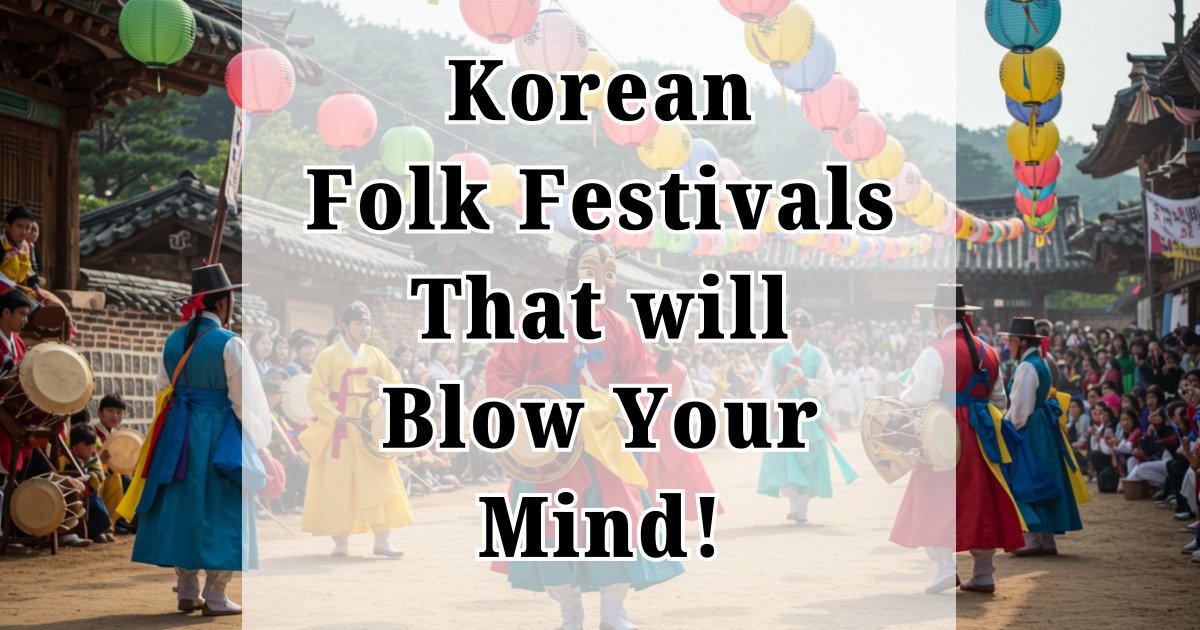Local folk festivals in Korea are an incredible way to explore the country’s rich cultural heritage, traditional performances, and regional food. Whether you’re planning your first trip or a seasoned traveler looking to go beyond the typical tourist trail, visiting local folk festivals in Korea can offer an unforgettable and authentic experience.
Why Local Folk Festivals in Korea Are a Must-See
From traditional mask dances to ancient harvest rituals, Korea’s folk festivals reveal stories of the past and the spirit of its people. Unlike commercial events in urban areas, these local celebrations reflect centuries-old traditions passed down through generations.
One of the most compelling reasons to attend local folk festivals in Korea is the opportunity to witness age-old customs come to life. You’ll hear the steady rhythm of samulnori (a Korean percussion quartet), watch vibrant parades filled with colorful hanbok (traditional Korean clothing), and taste regional specialties not found in big cities.
1. Andong Mask Dance Festival – Dive Into Korea’s Ancient Theater
Held annually in the historic city of Andong, the Andong Mask Dance Festival is one of Korea’s most iconic folk festivals. Local and international performers reenact traditional mask dances that date back to the Joseon dynasty. These dances, often satirical and humorous, were used to criticize the social elite and express the thoughts of common people.
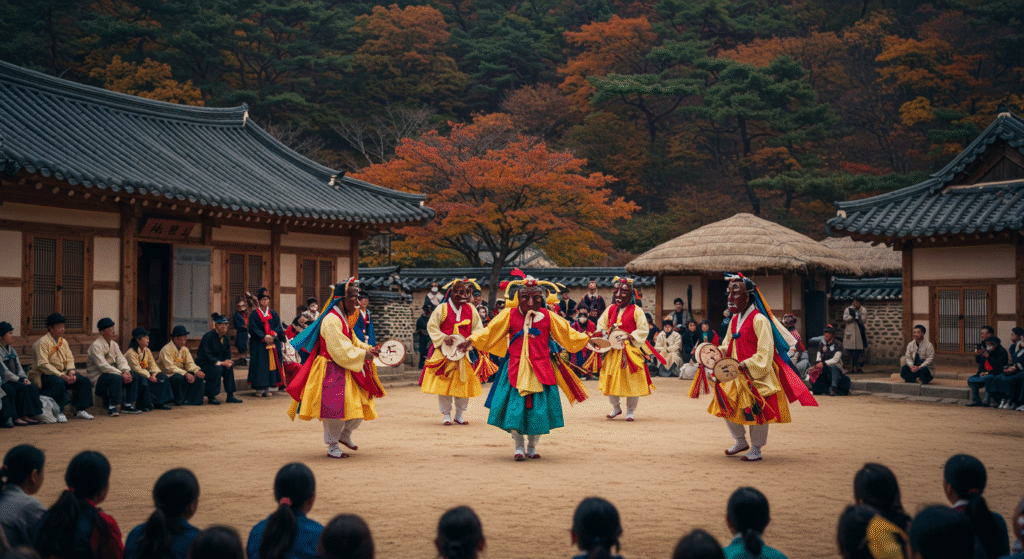
The main events take place at the Hahoe Folk Village, a UNESCO World Heritage site, where visitors can enjoy not only the performances but also participate in mask-making workshops. This festival perfectly embodies the essence of local folk festivals in Korea—connecting the past with the present in a vibrant, meaningful way.
2. Gwangju World Kimchi Festival – Where Tradition Meets Taste
Although not strictly categorized as a “folk festival,” the Gwangju World Kimchi Festival is deeply rooted in Korean tradition. Kimjang (the making of kimchi) is a communal activity with a rich heritage, recognized by UNESCO as an Intangible Cultural Heritage of Humanity.
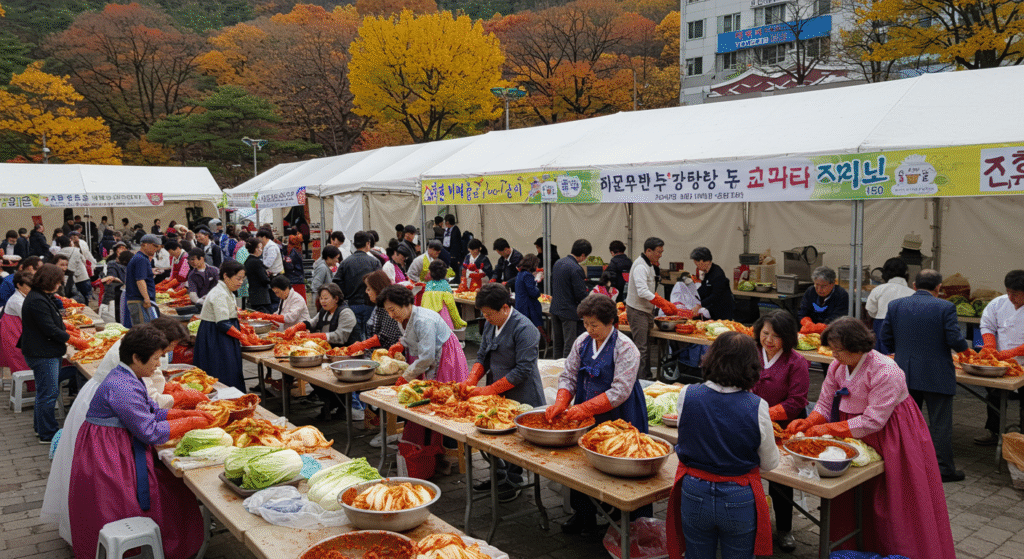
Every year, Gwangju becomes the epicenter of this cultural food celebration. Visitors can learn the traditional way of making kimchi, join contests, and sample hundreds of regional variations. It’s a delicious and immersive way to understand Korean culture. Moreover, this local folk festival in Korea emphasizes the importance of community, sharing, and seasonal food traditions.
3. Jinju Namgang Yudeung Festival – A River of Lights and Legends
Originating from a historical military tactic during the Imjin War, the Jinju Namgang Yudeung Festival has evolved into a breathtaking celebration of light and remembrance. This festival is held every October along the Nam River in Jinju, where thousands of lanterns float across the water, creating a magical scene.
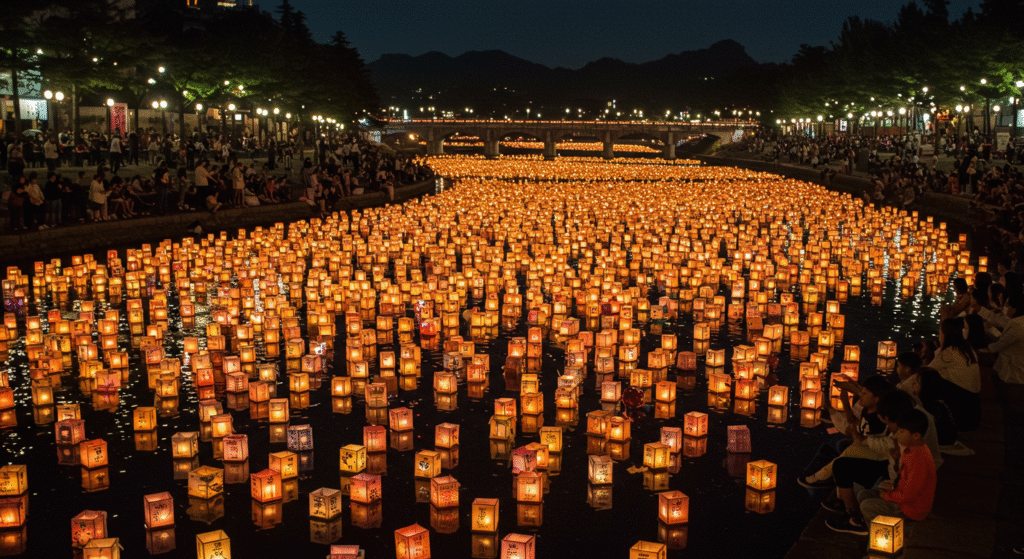
This festival also features traditional folk games, cultural exhibitions, and a lantern-making experience. It’s not just a spectacle, but a deeply moving cultural event. Among the many local folk festivals in Korea, this one uniquely blends beauty, emotion, and heritage.
4. Gangneung Danoje Festival – Korea’s Oldest Festival Still Thriving
Recognized by UNESCO, the Gangneung Danoje Festival is one of the oldest surviving folk festivals in Korea. Held in early summer, it celebrates the spiritual rituals of the East Sea region and the well-being of the community.
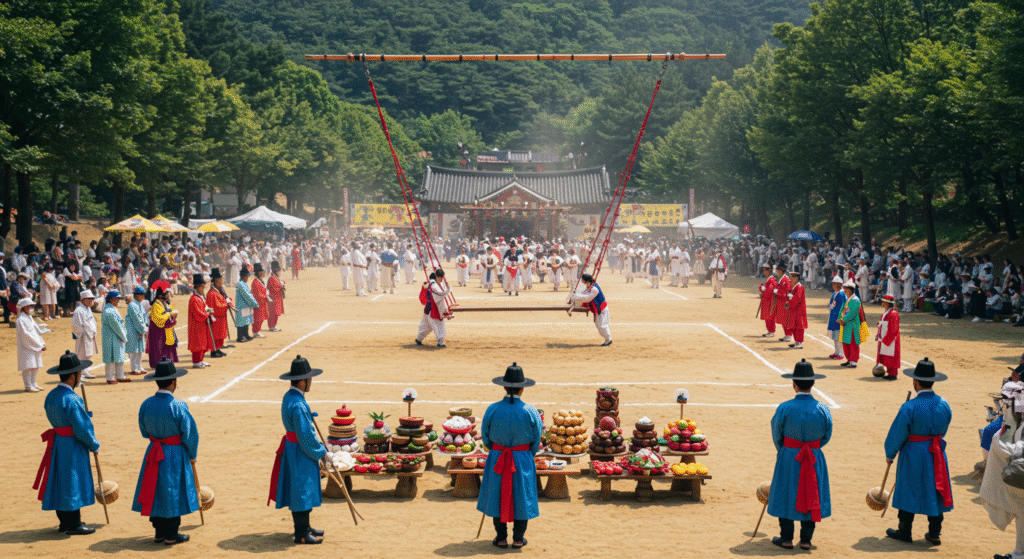
Visitors can watch shamanistic ceremonies, traditional wrestling (ssireum), and swing rides (geune) that are typically performed during the Dano season. Herbal hair washing and sacred food offerings are also part of this time-honored event. This festival is a living reminder of the spiritual and natural balance in traditional Korean life.
5. Jeonju Hanji Culture Festival – Crafting the Soul of Korea
Hanji (traditional Korean paper) is more than just a medium—it’s a cultural treasure. The Jeonju Hanji Culture Festival, held every spring in Jeonju, showcases this ancient craft. Workshops, exhibitions, and hands-on activities invite participants to make their own hanji crafts, from lanterns to notebooks.
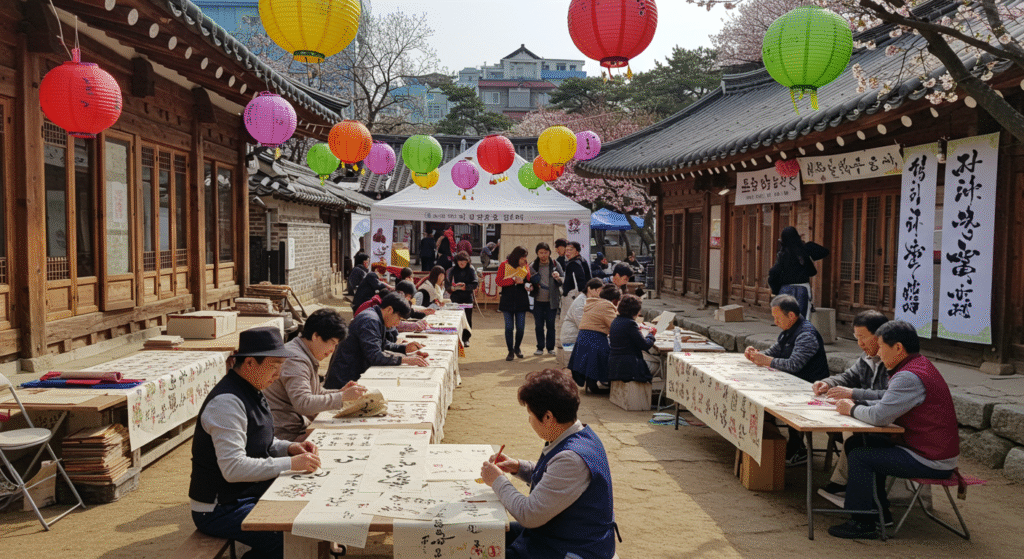
Local folk festivals in Korea like this one offer a slower, more introspective experience compared to big city attractions. They allow travelers to connect with Korea’s artisan spirit and creative heritage.
Experiencing More Than Just a Festival
When you attend local folk festivals in Korea, you’re not just watching performances or eating food. You’re stepping into a world shaped by thousands of years of customs, beliefs, and regional pride. Many of these festivals are held in scenic rural locations, giving visitors the chance to explore mountains, temples, and historic villages as part of the journey.
Interactive and Hands-On Activities
What sets these local events apart is their participatory nature. Whether you’re pounding rice cakes at a harvest festival or joining a shamanistic ritual dance, you’re not a passive observer—you become part of the celebration.
Connecting with Local Communities
Another unique aspect of local folk festivals in Korea is the warmth and hospitality of the local people. These festivals often rely on community involvement, so you’ll find yourself welcomed by villagers eager to share their culture. It’s not unusual to be invited to a meal or offered traditional snacks by friendly hosts.
6. Boseong Green Tea Festival – A Taste of Nature and Tradition
Boseong, known for its lush green tea fields, hosts an annual Green Tea Festival that blends agriculture, tradition, and cultural pride. While it may not seem like a typical folk festival at first glance, it includes rituals honoring nature, traditional tea ceremonies, and cultural performances passed down for generations.
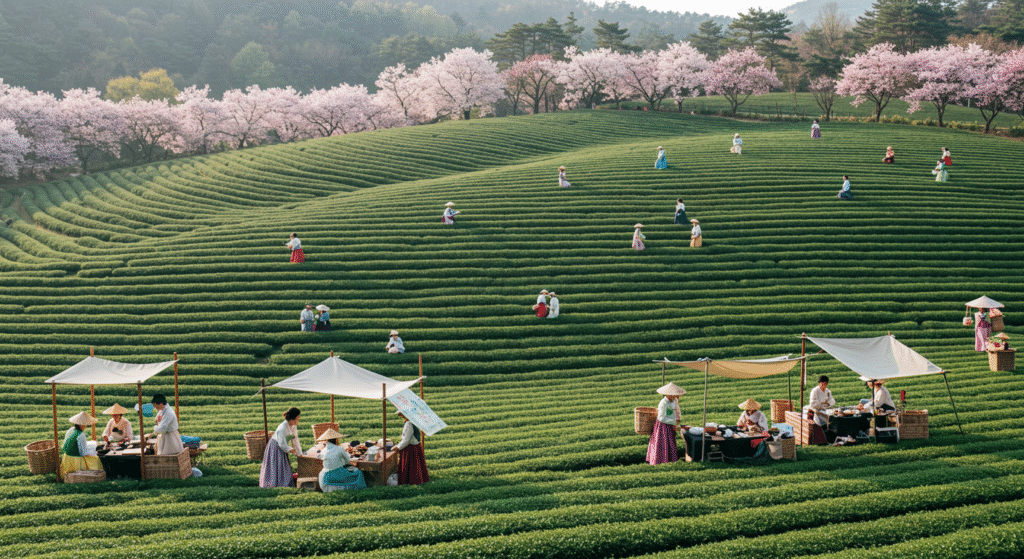
At this festival, visitors can experience everything from hand-picking tea leaves to participating in a ceremonial tea tasting led by experts in hanbok. Local food stalls also offer green tea-flavored everything—ice cream, noodles, rice cakes—making this one of the most flavor-packed local folk festivals in Korea.
7. Cheongdo Bullfighting Festival – A Fierce but Respectful Tradition
Cheongdo’s bullfighting festival is one of the more unique folk traditions in Korea. Unlike the Spanish version, Korean bullfighting involves two bulls locking horns rather than facing a matador. The event showcases strength, stamina, and local pride.
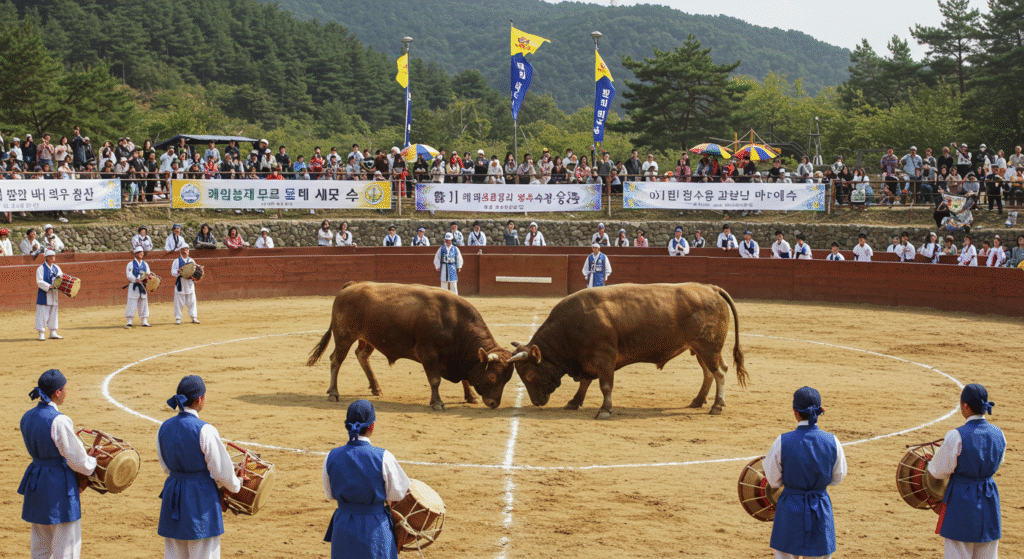
The festival, which also includes traditional music, dancing, and food fairs, has its roots in agricultural traditions, where the strength of bulls was historically tied to prosperity and fortune. This is yet another vibrant example of local folk festivals in Korea preserving rural customs while attracting modern-day visitors.
8. Miryang Arirang Festival – Music, Memory, and Emotion
“Arirang” is Korea’s most beloved folk song, and the Miryang Arirang Festival honors one of its regional variations. This lyrical festival includes dramatic reenactments, pansori (Korean opera), and cultural exhibitions tied to the theme of longing and resilience found in the song.
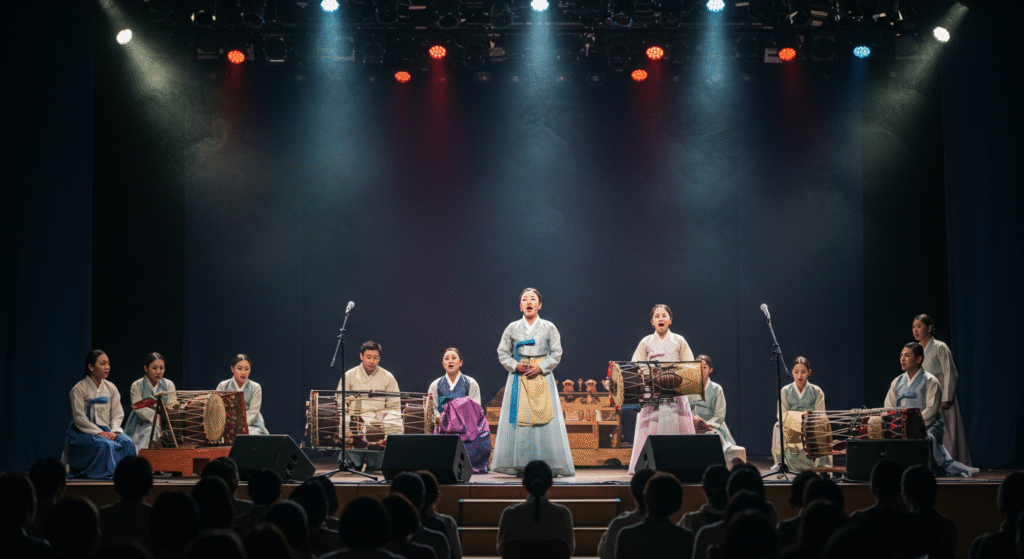
The emotional tone of this festival distinguishes it from others. Visitors often find themselves unexpectedly moved by performances that carry deep historical weight. Local folk festivals in Korea like this one illustrate how powerful oral traditions and music can be in sustaining cultural identity.
9. Jeju Fire Festival – Celebrating Agriculture with Flames
Every early spring, the Jeju Fire Festival (Jeongwol Daeboreum Fire Festival) lights up the volcanic fields of Jeju Island in a dramatic tribute to farming traditions. Rooted in the practice of burning old grass to rid the fields of pests, this festival has evolved into a large-scale fire show, complete with fireworks, torch parades, and folk games.
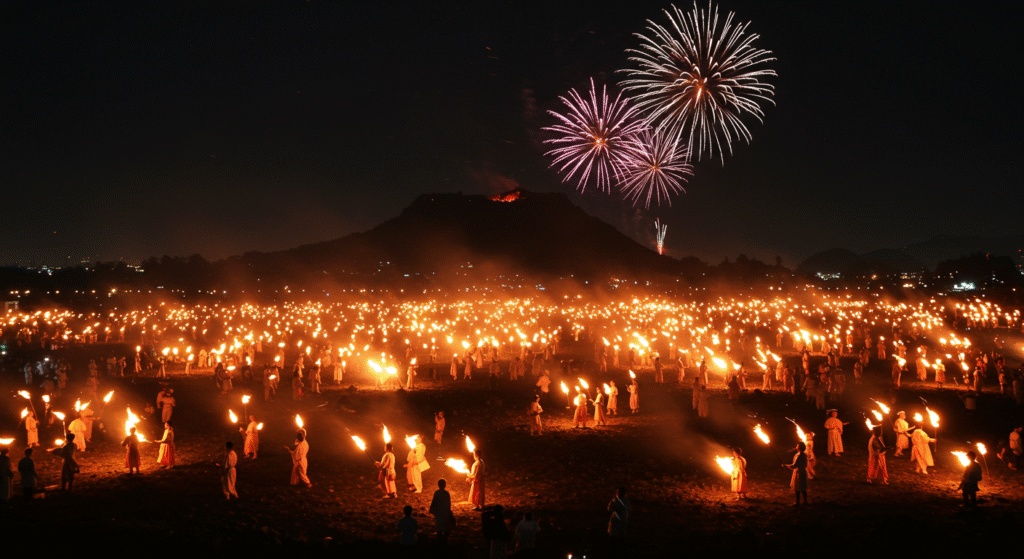
This fiery celebration honors ancestral wisdom and hopes for a bountiful year. If you’re seeking a more dramatic and elemental example of local folk festivals in Korea, this one literally lights up the night sky.
How to Plan Your Visit to Local Folk Festivals in Korea
If you’re considering attending one or more local folk festivals in Korea, here are some quick tips to make the most of your cultural adventure:
- Check Dates Early: Many festivals are held seasonally or tied to lunar calendars, so confirm the exact dates in advance.
- Book Local Accommodations: Small towns may have limited lodging options, especially during festival weeks.
- Learn a Few Korean Phrases: A little effort goes a long way in connecting with locals.
- Pack Traditional Etiquette: Respect for customs, dress codes, and temple behavior will enrich your experience.
- Embrace the Unexpected: Be ready for spontaneous invites, unplanned performances, and once-in-a-lifetime experiences.
🌟 Final Thoughts: Why You Shouldn’t Miss Local Folk Festivals in Korea
Whether you’re passionate about music, food, history, or craft, there’s a local folk festival in Korea that will speak to your soul. These festivals are more than just events—they are living, breathing chapters of Korea’s cultural book.
By visiting these places and engaging with the communities that preserve them, you don’t just observe tradition—you help sustain it. In a rapidly modernizing world, local folk festivals in Korea stand as resilient reminders of heritage, identity, and the enduring power of human connection.
So if you’re planning your next trip to Asia, don’t just think about palaces and skyscrapers. Think lanterns on a river. Think drums echoing through a mountain village. Think green tea in your hands, harvested with pride. Think about the magic waiting for you in local folk festivals in Korea.
If you want to read more post about Local Folk Festivals:
Ultimate Local Artisan Festivals Guide
Must-See 10 Local Folk Festivals During Winter
Incredible Local Folk Festivals During Autumn
Amazing Local Folk Festivals During Summer
Amazing Local Folk Festivals During Spring
